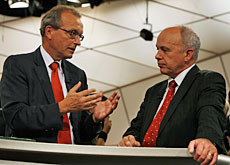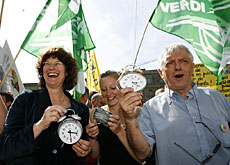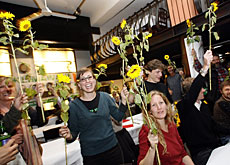Main parties undergo shake-up after elections

Less than one week after the parliamentary elections, the presidents of the two largest political parties have resigned – albeit for very different reasons.
The rightwing Swiss People’s Party president is leaving on a high after his party effectively won at the polls, but his centre-left Social Democrats counterpart came under pressure to go following a dismal result.
People’s Party head Ueli Maurer was the first to announce his decision on Friday. He leaves after more than 11 years at the helm of the party, during which it went from strength to strength, doubling its voter base.
In Sunday’s elections the People’s Party took a record 29 per cent of the vote, following a controversial electoral campaign focused, among other issues, on its outspoken Justice Minister Christoph Blocher and crime by foreigners.
Its posters depicting white sheep kicking a black sheep off a Swiss flag drew worldwide media attention and criticism from the United Nations.
Maurer, who will officially stand down next year, said he was leaving to devote himself “more deeply” to other political projects.
Right time to go
He added that it was the right time to go – the party had spread from its Swiss German powerbase across the country and had built up a good political infrastructure.
Maurer insisted that his decision had nothing to do with the upcoming Senate elections in Zurich. He is in the running for the second Zurich Senate seat, which remains undecided after the polls.
However, Social Democrat Hans-Jürg Fehr’s reasons for leaving his post as president – in March next year – are very different.
His party suffered a major defeat in the polls, dropping nine seats and taking 19.5 per cent of the vote, down by 3.8 per cent on 2003.
It was the worst result for Switzerland’s second largest party since 1991.
Announcing his resignation, Fehr, president for three years, said he was departing to ensure that the Social Democrats would be in a better position to analyse Sunday’s disappointing results and to build up a strategy for the future.
Fehr under pressure
Pressure on Fehr to resign had been mounting ever since the extent of the party’s losses became clear.
Observers say Fehr had never really managed to mobilise his party, seeing himself more as a “coach” than a charismatic leader.
Many blame the poor election result on the Social Democrats having failed to convince voters on social and environmental issues.
Part of its voter base was swept up by the Green Party, the other real winners of the elections, who saw a large increase in their voter share to almost ten per cent.
As for the successors to Maurer and Fehr, names have already been mooted in both camps. Both parties will decide on the issue next year.
For the People’s Party, two male politicians are said to be in the running. The Social Democrats, on the other hand, could have a female president, with several women candidates reported to be interested in the job.
swissinfo with agencies
Ueli Maurer
A farmer’s son, Maurer is 57 years old and from Zurich.
After being elected president in 1996, Maurer has widened the party’s voter base and stepped up its hardline stance on topics such as foreigners. He is now trying for a seat in the Senate.
Hans-Jürg Fehr
Fehr, 59, is from near Schaffhausen. The journalist joined the Social Democrats in 1977. By 1999 he was sitting in the House of Representatives.
Fehr became a surprise party president in 2004 – the media had tipped his rival – and was seen as an integrating and harmonising figure.
The second Zurich Senate seat remains undecided, after the first seat was won outright by centre-right Radical Felix Gutzwiller
Ueli Maurer was second, but short of the required number of votes for a seat. The Social Democrats and the Liberal Greens (a close third and fourth) have been fighting over who would face him.
Social Democrat candidate Chantal Galladé withdrew on Friday. Liberal Green Verena Diener will run against Maurer on November 25.

In compliance with the JTI standards
More: SWI swissinfo.ch certified by the Journalism Trust Initiative


You can find an overview of ongoing debates with our journalists here. Please join us!
If you want to start a conversation about a topic raised in this article or want to report factual errors, email us at english@swissinfo.ch.